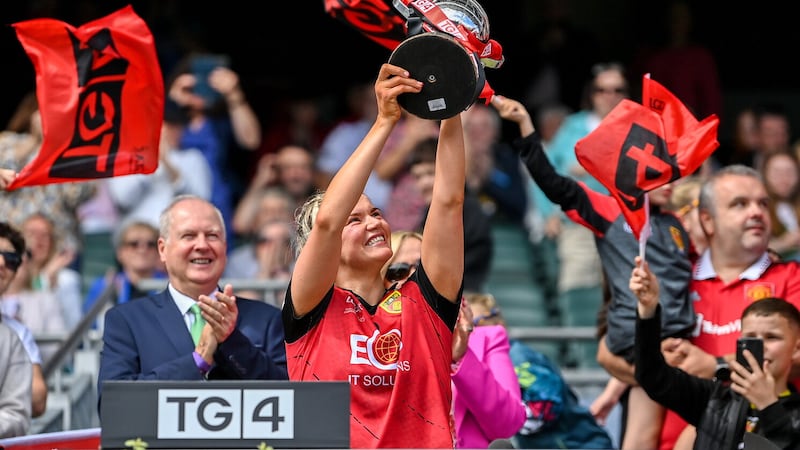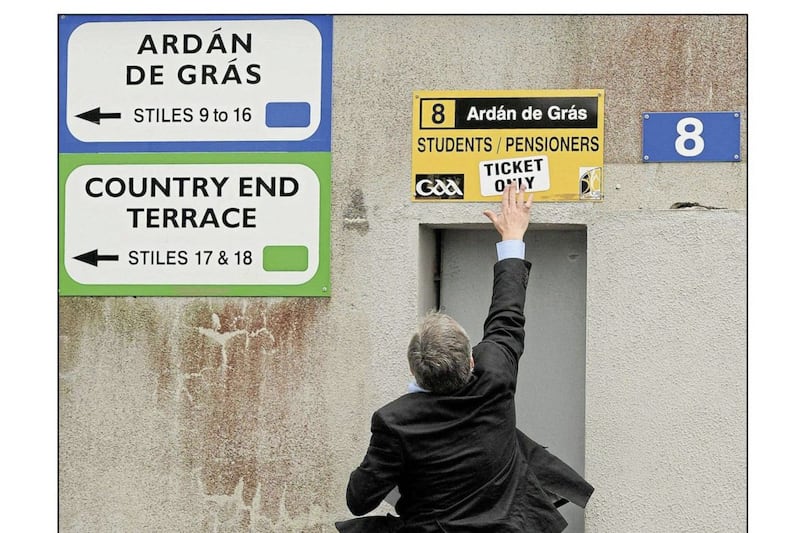JARLATH BURNS has urged GAA congress to back the motion to introduce the ‘mark’ or face “sleepwalking towards the death of a skill”.
The chairman of the GAA playing rules committee says the purpose of the mark - used in Compromise Rules and Aussie Rules - would safeguard the art of high fielding which, he believes, is already in serious decline in modern-day Gaelic football.
Although there have been rumours motion 41 could be withdrawn prior to the start of congress in Carlow on Friday night, Burns remains “hopeful” the merits of the mark will be fully debated.
Burns admitted there were elements of the modern game he disliked and that, at some stage, the GAA must intervene to preserve the finer elements of Gaelic football.
“We’re very passionate about the importance of the mark,” said Burns.
“We made sure that we were going to act responsibly, that we weren’t going to do anything irrational because we’re talking about our national game and you can’t do anything that would make the game contrived.
“The reason why we brought the mark in is the incidents of balls being caught in the middle of the field have declined rapidly in the last five years, so we’re sleep-walking towards the death of a skill.”
Burns himself excelled in the art of high-fielding during his inter-county career with Armagh and feels the mark is a way of protecting the skill. Many argue there is currently no discernible advantage from catching a high ball as opponents can tackle the player instantly to deny him space.
“The high catching is on its way out and, if we don’t do something to stop it going out of the game, we’re going to be reminiscing in 20 years time about pictures of Darragh O Se and John McDermott catching the ball and the way it used to be,” he said.
“It’s trying to give an advantage or a reason for the goalkeeper to kick the ball out to the middle of the field.”
The prevailing trend of Gaelic football is the use of the short kick-out: “The short kick-out is not what the game is about… Once you have the short kick-out, you are breeding the hand pass, hand pass, hand pass; you get to the 21-yard line and there’s another hand-pass. You have 15-or-20 hand passes and you’re not even at midfield. That is the ugly side of our game.”
The football rules committee is considering an experiment that would limit the amount of consecutive hand-passes teams can engage in. Joe Kernan and Damian Barton have backed the introduction of the mark, while Peter Canavan last month argued the modern game should be left alone and be allowed to evolve naturally.
Canavan said: “I think people are pressing the panic button with regard to our game because of a few games - and I would stress a few games in the National League [last year] that were very hard to watch - as there was so much to be enthused about our games.
“I could pick out games that were high-scoring, games where there was serious intensity and where there were tough physical exchanges; there were games where there was exceptional high fielding. Our game is so varied and there are so many aspects of skill that are being currently displayed.”
The two-time All-Ireland winner added: “I think people should forget about knocking the game and knocking the rules. Our game is evolving and is taking its natural course and we should be more excited with what we have.”
Burns, though, offers an opposite view to his former playing rival and believes the GAA must constantly review its playing rules: “If the game is evolving nicely and evolving into becoming more of a spectacle, that’s great," said the former Armagh captain.
"But if you remember a few years ago the hand-pass became like a throw-ball. And if you look at the game from the early 1980s, it was throw-ball, throw-ball and you could throw it into the net. It just became ugly. So that was changed and that was a good change.
“The square ball rule was also changed a few years ago and that proved to be a good change. That change brought back the big full-forward. Michael Murphy, Kieran Donaghy and Sean Quigley have profited from that,
“So this is another [rules] intervention. All it’s doing is giving a slight advantage - in fact, the player only gets the advantage when he performs the catch… It’s trying to give a chance to see this skill coming back into the game.”
Motion 41 in short: When a player catches the ball cleanly from a kick-out without it touching the ground, on or past the 45m line nearest the kick-out point, he shall be awarded mark by the referee. The player awarded a mark shall have the options of (a) taking a free kick or (b) playing on immediately.







